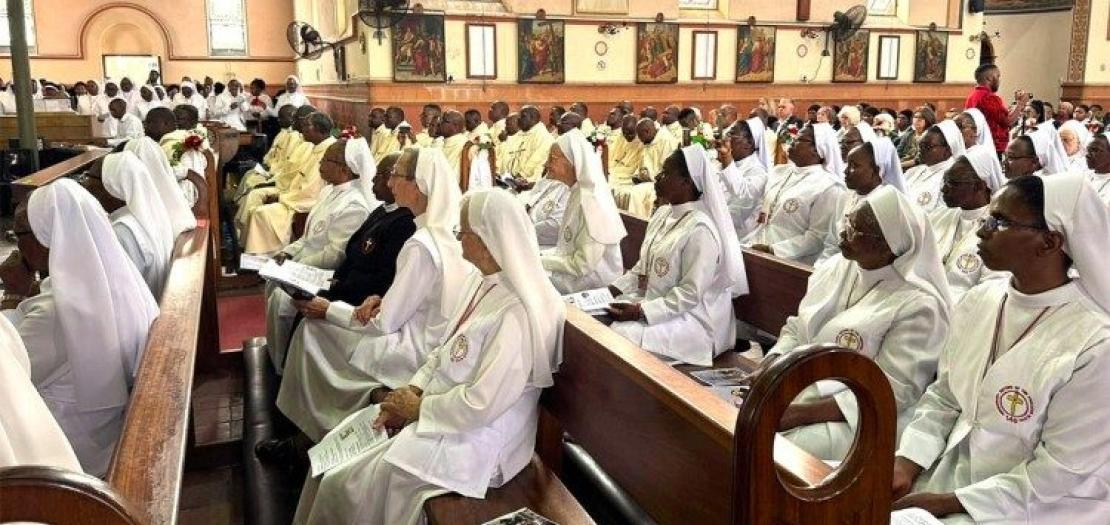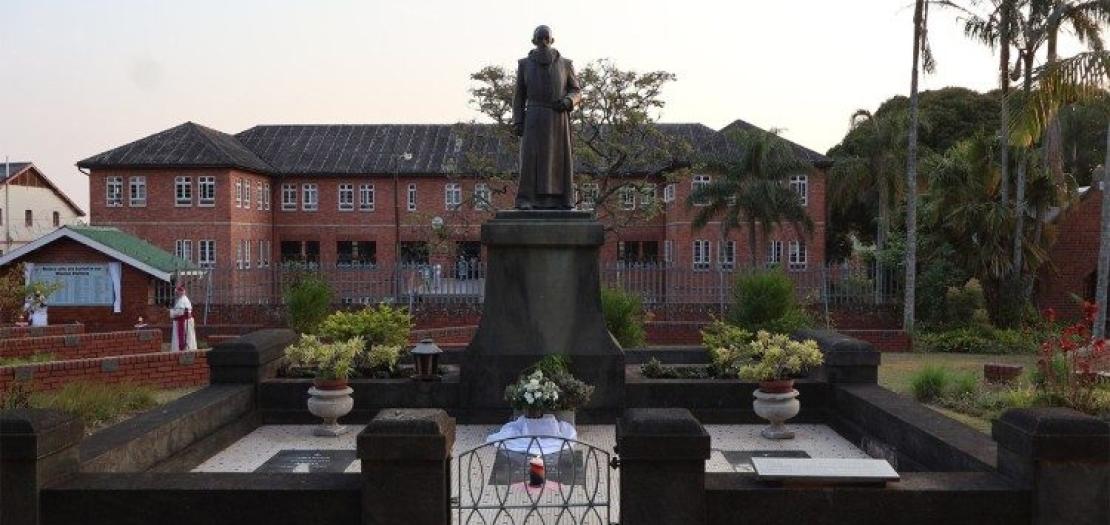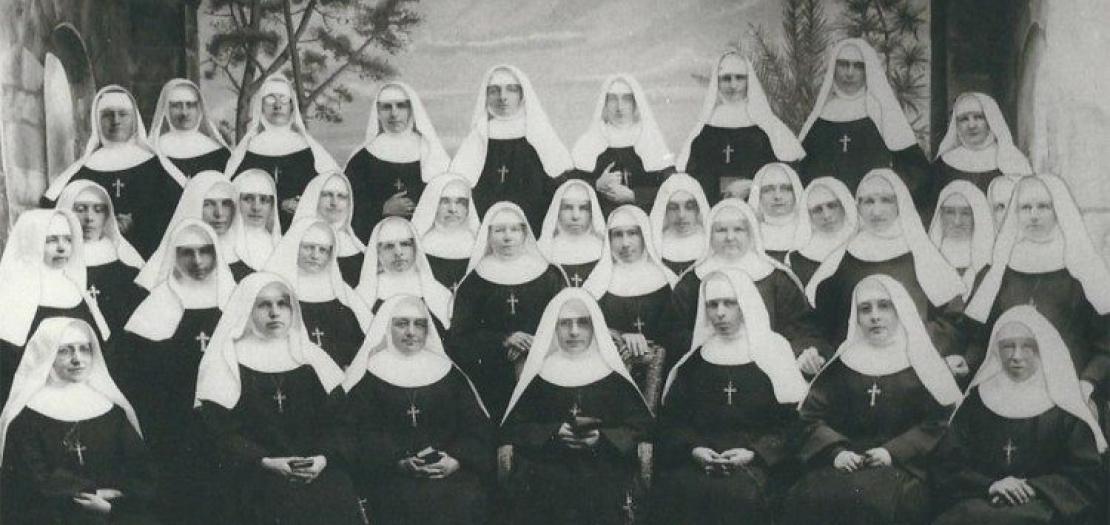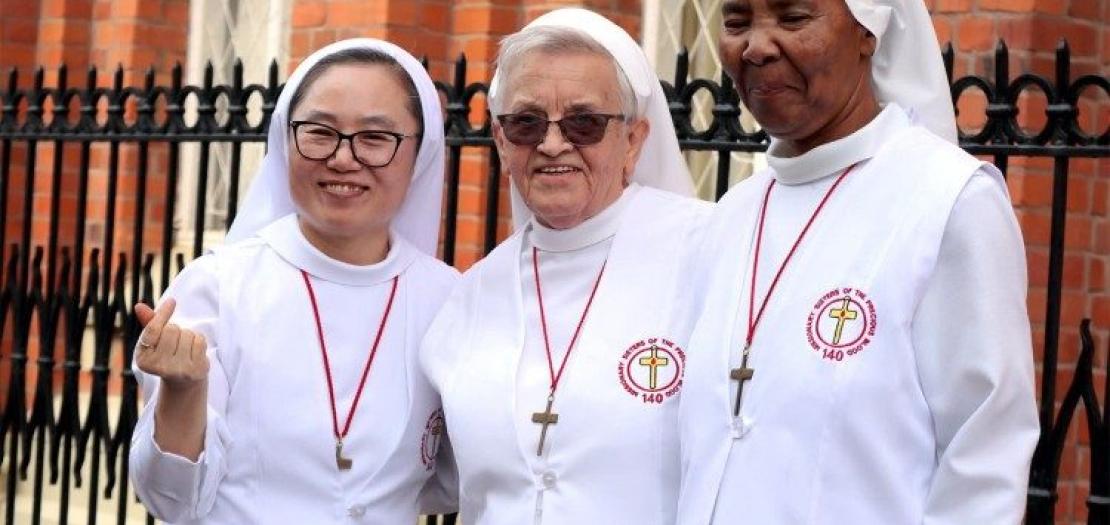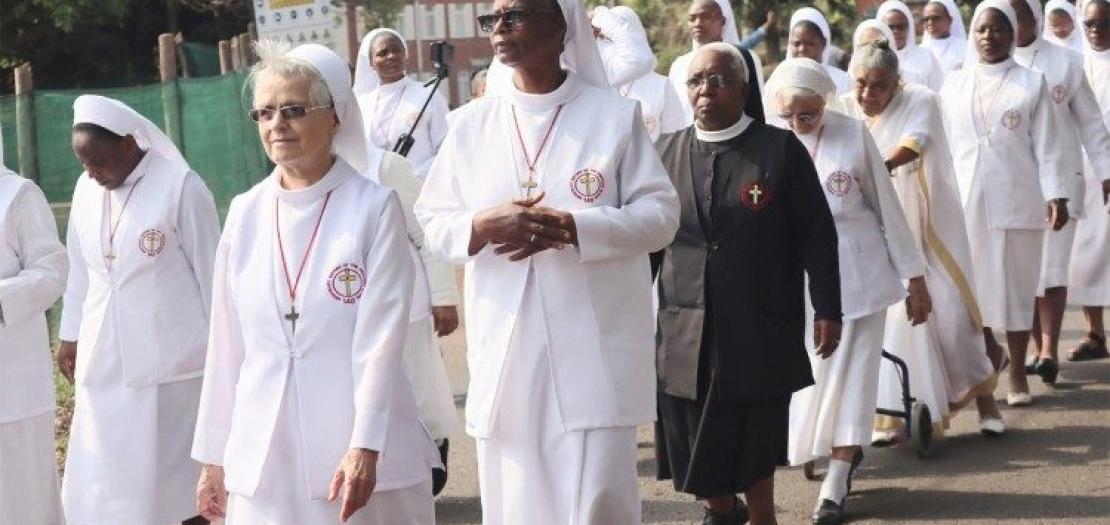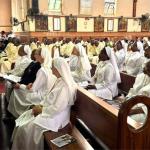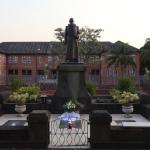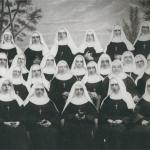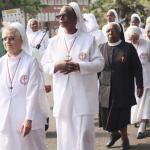Issued by the Catholic Center for Studies and Media - Jordan. Editor-in-chief Fr. Rif'at Bader - موقع أبونا abouna.org
In Mariannhill, South Africa, the Missionary Sisters of the Precious Blood gathered to celebrate the Eucharist, led by Bishop Neil Augustine Frank of Mariannhill Diocese, and honor their Founder, Abbot Francis Pfanner, buried in the congregation’s cemetery.
His resting place remains a symbol of faith, courage, and a reminder that one man’s vision can transform lives across continents. As the sisters look to the future, their mission continues to burn bright as they proclaim Christ’s reconciling love in every corner of the world.
To grace the occasion the Archbishop Siegfried Mandla Jwara of Durban Archdiocese, Bishop Thulani Victor Mbuyisa of Kokstad Diocese, Congregation of Mariannhill Missionaries (CMM), and a member of the Order of Saint Paul the First Hermit (OSPPE), Bishop Stanisław Jan Dziuba of Umzimkulu Diocese were also present.
Bishop Frank reiterated that, “It is God’s plan for the CPS to exist.” He recalled five courageous women who chose to let go of their comfort and proclaim Christ to the people in Africa, at the invitation of Abbot Francis to go to South Africa.
“It takes courage and perseverance to be a missionary; it’s their faith and upbringing that led them to set as a priority the Gospel injunction ‘Go out to the whole world and make disciples of all nations’,” he added. “These are not human attributes but the gifts of the Holy Spirit, this is the strength of God.”
Visionary founder
The story of the sisters is inseparable from the life of their founder, Abbot Francis Pfanner, a Trappist monk known for his deep spirituality, silence, and contemplative life.
The Trappists follow a strict monastic tradition marked by solitude, prayer, and strictness. Abbot Pfanner dared to dream differently. In a prophetic move that defied the norms of his time, he envisioned something new.
Moved by the plight of women and the girl child in South Africa during the late 19th century, Abbot Pfanner recognized that evangelization and social transformation required the active presence of women religious.
Breaking from the traditional monastic mold, he founded a missionary congregation of sisters dedicated to prayer and action ‘Ora et Labora’ bridging contemplation with service.
His dream to found an active missionary congregation of women, dedicated to uplifting the poor and marginalized especially women and the girl child in KwaZulu-Natal, South Africa.
Birthplace - Mariannhill, South Africa
In 1885, in Mariannhill near Durban, South Africa, the Missionary Sisters of the Precious Blood were born.
Abbot Pfanner’s dream took shape when the first sisters, “young women from Germany,” arrived in Mariannhill with a missionary zeal that laid the foundation of the congregation.
Their mission was clear to educate, uplift, and empower women and children, while serving the spiritual, material needs of local communities, health care, and social development. This marked the birth of a congregation that would grow beyond the first vision.
From European birthed in African soil to Global Mission
The beginnings of the congregation were distinctly European structured, organized, and deeply influenced by the spirituality of their homeland. Soon, the mission grew beyond boundaries.
Responding to the needs of the Church, the congregation spread across Africa, Europe, the Americas, Asia, and Oceania taking root in different cultures and societies.
Their presence extends to rural missions, cities, and challenging places where the need for reconciliation, compassion, and healing is greatest.
As the mission expanded, the Motherhouse, originally located in Mariannhill, South Africa, was later moved to the Netherlands, signaling the congregation’s growing international identity and a new chapter in the congregation’s history.
A global presence and diverse ministries
Today, the Sisters serve in numerous countries, carrying forward their founder’s vision. Their apostolates varied as the needs of the world.
Having founded for the nurturing of the women and girl child, they run and work in schools at all levels, from kindergartens to universities, forming minds and hearts of the young people to be better citizens.
Keeping a keen ear to their founder’s words of reading the signs of time and needs, they ventured into healthcare—running hospitals, clinics, and mobile units reaching the most vulnerable, in the villages and the marginalized areas.
The sisters carry out extensive pastoral and spiritual ministry to the sick, the aged and those in desperate situations, catechesis in parishes and schools, run a catechetical center, giving of retreats, guidance, and intercessory prayer done more by the senior sisters who are no longer active in ministry.
Social work and advocacy to empowering marginalized communities, supporting orphans, women, and the elderly, as they make the precious blood fruitful through the service and ministry they render to the marginalized.
Agriculture and environmental care paramount, while promoting sustainable practices and food security, as they train the people who benefit directly from their ministry and for their consumption.
Their founder was open to people with different gifts and talents, and so arts, music, and liturgical services are part and parcel of their ministry in fostering creativity and enriching worship and esthetics wherever they are, as they use the same gifts and talents to empower those whom they serve.
The sisters are missionary in their being present, and so they carry forth the banner of missionary animation and awareness inspiring others to live the missionary spirit, and being the Christ who is much needed in our world today, among other ministries.
Living the charism
The congregation has remained anchored in its charism, to live and proclaim the redeeming love of Christ’s Precious Blood through reconciliation, healing, and life-giving service.
In a changing world, the sisters continue to answer God’s call with courage, adapting their ministries to modern realities while holding fast to their spiritual roots.
Cheerful echoes
“The celebration is uplifting to all sisters, associates and guests, joyful and spirit filled togetherness to be remembered. We should keep up and not get discouraged, and carry on and renew our spirit, for celebrating 140 years, it's truly a remarkable achievement to us,” said Sr. Mary Christine Pohland as the German serving in South Africa celebrated 70 years of religious life.
“140 years since our foundation shows an enduring legacy of our founders and the pioneers. If it wasn't for their dedication, hard work, passion and the perseverance, I really don't know whether we would have managed to celebrate this milestone. We’re not celebrating the past, but we are also embracing the future,” said Sr. Oliver Nansitu.
“It was a very beautiful powerful event which brought us back to the congregations beginning and the congregation in our time, it shows that father founder, founded the beautiful congregation of women, and we follow him,” said Sr. Dagmar Walz from Germany, celebrating 64 years of religious life.
“The Precious Blood is the price of our redemption; therefore, our lives must be dedicated to service and sacrifice,” said the Servant of God, Abbot Francis Pfanner.


